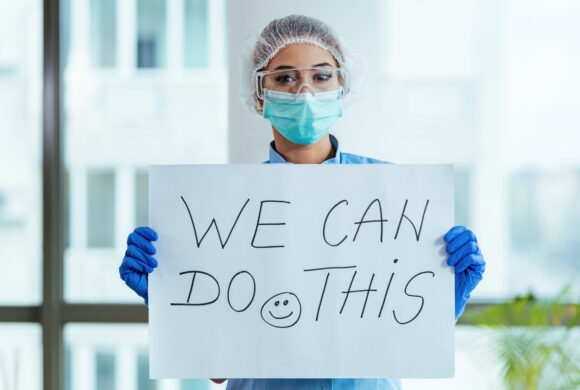After a year and a half of living under lockdown and social restrictions, people are clamoring to leave their homes and interact. According to the CDC, as of June 18th of this year, 57.2% of all Americans have received at least one dose of the vaccine.
Many businesses are lifting their Covid restrictions, and with summer in full swing, people will want to make a beeline for the beach, or host a backyard BBQ, or head to the ballpark to see a game. Employers are asking their staff to come back to the office. Although this return to near “normal” will be celebrated many, others find themselves in a constant state of fear and anxiety and for good reason.
The United States recently surpassed 600,000 known coronavirus deaths. Chances are you either knew someone who died or someone you know had a love one who passed. What’s more, this pandemic isn’t over. Doctors are now predicting a new fourth wave of the Covid-19 pandemic, and the mental health impacts will be “profound and far reaching.” European psychologists Maracantonio Spada and Ana Nikčević have coined this constant state of post-pandemic anxiety “Covid-19 anxiety syndrome.” Symptoms can mirror other conditions such as PTSD and obsessive-compulsive disorder. Those who find themselves socially isolated, or who have financial difficulties, or other mental health conditions are at a much higher risk.
There several reasons why people experience post-pandemic anxiety. Some of us simply have a hard time coping with change. In early 2020 when the entire world was affected, these people were forced to completely uproot their daily routines. After 16 months of living the Covid-way-of-life, they are now expected to change their routines yet again. Others free unsafe in this politically-charged atmosphere. They may have been taunted because they wore a mask. They see fights breaking out on planes and in grocery stores and would rather stay home. Even some who have been fully vaccinated are terrified of contracting one of the variants still circulating or to give the virus to someone who hasn’t been vaccinated.
For others, the pandemic has brought about positive changes in their lives, and they’re afraid of losing what they’ve gained. For many who wrestle with alcoholism, being under lockdown has allowed them to find sobriety without any social pressures. They fear relapsing as the world begins to open. Some have become accustomed to working from home and don’t want to commute to the office anymore. They realize just how expensive daycare is and found that having the kids at home while they work saves them a ton of money. They have reevaluated what’s really important in their lives, and it’s not the quest for constant productivity. They’ve made their friends, families, and their own mental well-being a priority. The thought of returning to their pre-Covid lives is frightening.
For those experiencing stress at the thought of going back to life before Covid-19, here are 5 helpful tips to decrease post-pandemic anxiety:
Remember, you are in control. Just because you’ve gotten the vaccine doesn’t mean you have to return to normal all at once. Don’t be afraid to tell people that you want to take it slowly. You don’t need to accept every backyard get together this summer. Without any guilt or pressure, tell your family and friends that you want to start to engage at your own pace. Ask others how they feel and share how you feel. That way, if you find yourself in a situation where you don’t feel comfortable, there’s power in knowing you can leave at any time. Setting your own boundaries is a great form of self-care during this extraordinary time.
Know that you’re not alone. We’ve just lived through a period in time that will be recorded in history books and taught in schools. Everyone in the world is in the same boat of relearning how to socialize in person. Dr. Avital Falk, program director of the Intensive Treatment Program for OCD and Anxiety at the New York-Presbyterian Youth Anxiety Center, reminds us that, “It takes practice to overcome fear. It takes practice to get back in the groove on a social level.” The more you start to interact with others, little by little, the more comfortable you will feel.

Embrace your emotions. Know that it’s natural to feel anxious about going back to normal. In a study conducted by Emily Kroska, a clinical psychologist at the University of Iowa, those who were able to identify their emotions (anger, fear, sadness, anxiety, loneliness) were more likely to reduce their post-pandemic stress levels. She added that those people who took stock of their emotions and talked about them with family and friends reported lower stress levels than those who avoided addressing their emotions.
Develop a post-pandemic life plan. The fact that the entire world hit pause can turn out to be a blessing in disguise. This can be the “do over” you never thought possible. How do you want your life to look? Planning your post-pandemic life can bring you a sense of self-confidence, focus, and clarity that can dispel your anxiety. Buy a corkboard or a magnetic whiteboard and hang it in a place where you will see it often. Put up pictures of things you want to do, places you want to see, and goals you want to achieve. Start dreaming and create your own “new normal.”
Seek professional help. If you find that your fear and anxiety is overwhelming, it may be time to get help from a mental health professional. It’s easier than you think. Nowadays, many psychologists and psychiatrists are conducting sessions remotely which means you can seek therapy without ever leaving home.
We humans are social beings. Isolation isn’t good for our physical or mental well-being. Although it’s normal to feel anxiety over getting back to normal, you can lessen your stress levels by having patience with yourself, by opening up at your own pace, and by seeking professional help if needed.
If you are interested in learning more about therapy or would like to set up an appointment at Centered Therapy Chicago, call 773-569-1468 or email us at ctc@centeredtherapychicago.com

